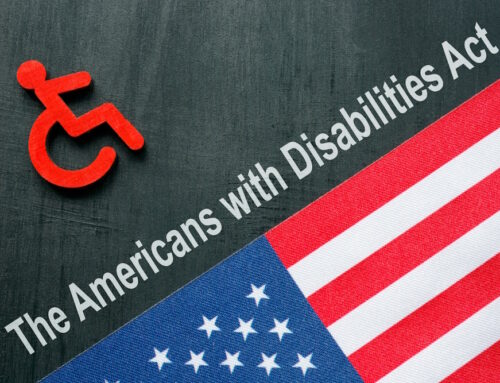Settlements in disability law cases are a common occurrence. They allow both parties to avoid the uncertainties of trial and come to a mutually agreed upon resolution. For those navigating the complex disability rights legal system, settlements can provide more immediate compensation along with closure. However, they also require forfeiting the potential reward of a successful trial verdict. This article provides an overview of a disability settlement.
Brief Overview of Disability Law
Disability discrimination laws refers to the body of legislation that prohibits discrimination based on disability and guarantees certain rights and accommodations. Key laws include the Americans with Disabilities Act (ADA) which ensures equal access and opportunity in areas like employment, transportation, government services, and public accommodations. Other relevant laws are the Individuals with Disabilities Education Act (IDEA) and Section 504 of the Rehabilitation Act. These laws establish rights like reasonable accommodations in school and the workplace.
Oftentimes, the disabled individual will hire a disability lawyer to give legal advice on the disability discrimination laws and to help build an effective disability claim.
Why Settlements Occur
A lawsuit over disability rights will often end in a pre-trial disability settlement for several reasons:
- Both parties want to save time and money associated with a lengthy trial
- Defendants want to avoid further negative publicity and public relations damage
- Plaintiffs seek swifter compensation instead of waiting through the trial process
- Settlements provide guaranteed money whereas trial outcomes are uncertain
While settlements may shortchange a stronger disability claim, they offer plaintiffs immediate funds to pay pressing medical bills or living expenses.
The Settlement Process
If both parties agree to settle, they hammer out a binding legal agreement ending the dispute. Key terms typically include:
- Compensation Amount: The dollar amount paid to the plaintiff by the defendant
- Liability Release: Plaintiff agrees not to take further legal action against defendant
- Confidentiality Clause: Plaintiff promises not to discuss or disclose settlement details
- Payment Terms: Schedule of payment amounts and dates
A settlement agreement can take months of back-and-forth negotiations before both sides compromise on acceptable terms. Defendants start with low offers while plaintiffs ask for maximum payouts. Attorneys generally negotiate to reach an equitable middle-ground settlement.
Key Terms in Disability Settlements
Compensation: The monetary damages paid out to the plaintiff for losses and injuries sustained. This can include coverage of medical costs, lost wages, lowered future earnings, emotional distress, and pain/suffering.
Punitive Damages: Additional penalty amount aiming to deter and punish especially egregious civil rights violations. Punitive sums are less common in settlements.
Non-Disclosure Agreements: A legally binding provision requiring parties to keep the settlement amount and terms confidential. This benefits defendants to avoid reputation damage from public knowledge of settlements.
Lump Sum Payment: Single total payment amount rather than structured smaller installments over time. Lump sum settlements allow plaintiffs immediate access to money for pressing needs.
Settlement Agreement: Formal legal contract signed by both parties stipulating all binding settlement terms and ending the dispute. This is drafted by attorneys and makes the settlement legally enforceable.
An Example of a Settlement Case
EEOC v. Walmart
The Equal Employment Opportunity Commission sued Walmart for firing an employee with cerebral palsy named Marlo Spaeth for absenteeism related to her disability. Though Walmart claimed the absences were too frequent to accommodate, the case settled for $80,000 in back pay and damages. As part of the settlement, Walmart also agreed to train management on ADA leave requirements.
Pros & Cons of Settling
Pros
- Quicker payout: Settlement money is paid out faster than waiting through lengthy trials and appeals. This provides plaintiffs with timely funds to manage pressing medical and living costs.
- Certainty: The guaranteed settlement amount lowers risks compared to unpredictable trial verdicts. Even strong legal cases can lose at trial.
- Lower burden of proof: Settlements have a lower proof burden whereas trials require definitively proving claims and damages.
- Avoid trial costs: Significant legal and expert witness expenses to prepare for and conduct a trial are avoided.
- Control over terms: Settlements allow customized terms versus general court judgments. Plaintiffs can demand confidentiality, structured payments, etc.
Cons
- Potentially lower compensation: Settlement amounts tend to be lower than potential jury awards, especially for strong claims. Egregious civil rights violations may warrant higher punitive damages only awarded at trial.
- No precedent set: Since cases settle confidentially without a court decision, no new legal precedent is established to help other plaintiffs down the line.
- No admission of liability: As part of most deals, defendants do not have to admit fault or responsibility for violations so accountability is limited.
Tips for Navigating Settlements
Those pursuing disability lawsuits should consider several key factors when weighing settlement offers:
1. Consult an experienced disability attorney
Navigating the nuances of a settlement requires understanding complex disability legislation few laypeople possess. Qualified attorneys intimately know case strengths/weaknesses, potential damages, and what constitutes fair deals. Their expertise informs smarter negotiations and substantially higher settlement sums.
2. Research case value
Consult online settlement calculators and jury verdicts in comparable cases to reasonably value claims. Compare potential trial awards to settlement offers when deciding if deals are equitable. Those settling too hastily often leave substantial sums on the table by underestimating case worth.
3. Hold out for better offers
Many large entities start with extremely lowball offers expecting claimants to settle hastily. But repeatedly rejecting offers signals seriousness and drives up settlement amounts closer to fair value. Having patience and turning down initial offers generally yields much higher sums.
4. Seek experienced mediators
If negotiations stall, enlisting respected mediators can facilitate mutually agreeable settlement terms. They identify reasonable middle grounds and skillfully broker deals satisfying both sides. Top mediators have extensive knowledge of case merits and liability risks that inform their proposals. Their neutral facilitation is key for overcoming impasses between parties.
Improving Your Chances of Winning
Those denied disability benefits or facing discrimination can take proactive steps to bolster their chances of successful legal outcomes or settlements:
Paperwork & Record Keeping
Meticulously documenting disability symptoms, work/school limitations, and denied accommodations is imperative. Records like doctor evaluations, workplace correspondence, dated photos, journals, and witness statements help substantiate claims. Thorough records make cases stronger and more likely to win.
Disability Attorneys
Hiring experienced disability attorneys dramatically improves legal outcomes with close to double the success rates. Top lawyers intimately understand decision biases by judges and juries. They frame cases favorably and prepare exhaustive legal briefs swaying outcomes. Their expertise in navigating the system offers major advantages.
Trial Preparation
Treating disability trials with utmost diligence and preparation prevents undermining otherwise strong cases. Making good impressions requires appropriate courtroom dress, demeanor and language. Plaintiffs should work closely with attorneys to practice addressing lines of questioning. Meticulous preparation enhances perceived credibility and sways judges/juries.
Appealing Denials & Reevaluation
For those denied disability benefits like Social Security Disability Insurance (SSDI), appealing unfavorable decisions is imperative before turning to lawsuits. Two useful options include:
Appealing Denials
Over 60% of SSDI claims get denied, but about 50% of appeals eventually get approved after passing stages of reconsideration and hearings. Persistence through each iterative appeals phase greatly improves approval odds as different reviewers re-evaluate substantially similar information.
Requesting Reevaluation
Alternatively, those initially denied can proactively request a case reevaluation if disabilities substantially worsen. Supplying new medical evidence demonstrating heightened limitations or restrictions makes approvers more likely to reverse earlier unfavorable judgments. Reevaluation presents another avenue for getting denials overturned without lawsuits.
Key Terminology
Americans with Disabilities Act (ADA): Civil rights laws prohibiting disability-based discrimination and requiring reasonable accommodations in employment, public settings, transportation, and communications.
Individuals with Disabilities Education Act (IDEA): Legislation guaranteeing educational access and support services to those with disabilities to facilitate academic achievement. Requires Individualized Education Programs (IEPs) tailored to unique needs.
Reasonable Accommodations: Disability-related adjustments to environments/policies not imposing undue hardship on organizations. This can include physical space modifications, work schedule changes, or providing assistive equipment.
Compensatory Damages: Monetary compensation for tangible losses and harms incurred like medical bills, lost wages, lowered future earnings potential, and damaged property/equipment due to civil rights violations.
Punitive Damages: Additional penalty sums aiming to punish and deter future egregious violations based on behavior being intentionally harmful, reckless, malicious, or grossly negligent.
Expert Witnesses: Specially qualified professionals who testify in trials based on expertise. Common examples in disability cases include vocational experts, medical professionals, economists calculating damages, and investigators describing violations.
Mediator: Neutral third party facilitating mutually agreeable settlements between adversarial legal parties through compromise. They identify middle grounds satisfying both sides to overcome negotiation impasses.




